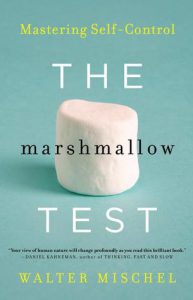One of the most important characteristics for success is the ability to delay gratification: to persist in a task or goal in spite of tempting distractions. How do we build this valuable executive function skill in our students? For starters, here is an “If, Then” planning sheet to use with students; but read on . . .
In the 1960s, Stanford University professor Walter Mischel devised the marshmallow test in which he gave preschoolers a choice: eat this one marshmallow now or wait fifteen minutes and you’ll get two. It is interesting to watch videos of the test, with some children simply eating the marshmallow and others doing everything possible to delay gratification  in order to get the better prize! Ultimately, as researchers followed the children through school and life, those who were able to delay gratification ended up with better outcomes and accomplishments in later years.
in order to get the better prize! Ultimately, as researchers followed the children through school and life, those who were able to delay gratification ended up with better outcomes and accomplishments in later years.
In his book, The Marshmallow Test, Mischel shares the story of this test along with brain
physiology that can help you better understand your students. For example, the limbic system (primitive brain structures) handles basic drives and emotions; Mischel calls it the “hot system,” where decisions to act are made quickly without regard for long-term consequences. The pre-frontal cortex, home of executive function, is then the “cool system” that includes complex, reflective decision making. Obviously, the more you can build this “cool system” (aka executive function) in students, the better. And the more “cool” you are, the better you fare in life.
The planning sheet above addresses just one approach to activating your cooling system presented by Mischel. Students of all ages can use it. Just have them consider a short-term goal they are trying to achieve in which they could be derailed by distractions. Have them anticipate those distractions and consider how they would thwart them. This could be a phrase they would say to themselves or an action they would take. Later, they can reflect (another executive function skill) on how well they did in staying on track.
For more on executive function:
- My video on executive function as the missing link to student achievement
- How the Learner-Active, Technology-Infused Classroom builds executive function (click demo and access pdf on the upper right side)
- Chapter 6 of It’s Not What You Teach But How
- The Executive Function Assessment on the IDEportal (click demo and access pdf on the upper right side)
- A previous blog post introducing executive function
- IDE Corp.’s Virtual Learning Community online courses
